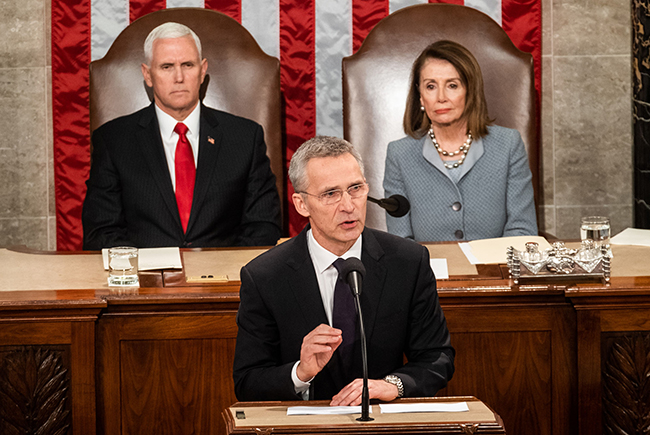
NATO Secretary General Jens Stoltenberg addresses a joint session of Congress on April 3, 2019, in Washington, D.C. NATO photo.
NATO Secretary General Jens Stoltenberg used his appearance before a joint session of Congress to play down disputes within the Alliance and to emphasize the importance of the group to US security.
Stoltenberg spoke in the US Capitol on the group’s 70th anniversary, reminding American politicians and the world that the measurement of a country’s strength isn’t just its economy or the size of the military, but also how many friends it has.
“And through NATO, the United States has more friends and allies than any other power,” Stoltenberg said. “This has made the United States stronger, safer, and more secure. … It’s good to have friends.”
Stoltenberg’s speech comes at a tumultuous time for NATO, as President Donald Trump and the administration continue to pressure other Alliance members to invest more in defense. Trump, appearing with Stoltenberg on Tuesday at the White House, said that although the US-NATO relationship is “very good,” there’s work to do in “getting some of our allies to pay their fair share. It’s called burden-sharing and, as you know, when I came, it wasn’t so good. And now it’s catching up.”
Stoltenberg directly addressed the issue of funding, saying in the past two years European allies and Canada have increased their spending to $41 billion, with that projected to increase to $100 billion in the next two years.
“This is making NATO stronger,” he said. “That money allows us to invest in the new capabilities our armed forces need. … This is good for Europe, and it is good for America.”
Additionally, Stoltenberg highlighted differences between member nations on the future of the Iranian nuclear deal, trade, climate change, and energy. These are “serious disagreements,” but there have been other serious disagreements before, such as the Suez Crisis in 1956, the French withdrawal in 1966, and the Iraq War in 2003.
“The strength of NATO is that despite our differences, we have always been able to unite around our core task. To defend each other, protect each other, and to keep our people safe,” Stoltenberg said. “We have overcome our disagreements in the past. And we must overcome our differences now. Because we will need our alliance even more in the future.”
Among the challenges facing the Alliance are the “generational fight” against terrorism, threats in cyberspace, and a shift in the “global balance of power” with a more assertive Russia and an emerging China.
Specifically on Russia, Stoltenberg criticized the illegal annexation of Crimea, the illegal chemical weapon use in the United Kingdom, support for Syrian President Bashar al Assad, Russian-led cyber attacks, its violation of the Intermediate Range Nuclear Forces Treaty, “and attempts to interfere in democracy itself.”
NATO has responded, he said, with the “biggest reinforcement of our collective defense in decades,” including deploying combat ready forces in Eastern Europe, increasing the readiness of forces across the board, and by stepping up cyber defenses.
“We do all of this not to provoke a conflict, but to prevent a conflict and to preserve the peace,” Stoltenberg said.
Stoltenberg also used his speech as a reminder that NATO is active in the counter terror fight, with a large force in Afghanistan that has been deployed since the beginning of the war—the only time Article 5 of the organization’s Washington Treaty was invoked for collective defense. NATO’s “goal is not to stay there forever,” he said.
“We went in together, we will decide on our future presence together, and when the time comes we will leave together,” Stoltenberg added.
NATO forces also are remaining in the anti-ISIS fight even though the group’s physical caliphate has ended.
The continued effort in these ongoing fights shows the close connection between the US and NATO.
“We must do everything in our power to maintain that unity for future generations,” he said. “Because, come what may, we are stronger and safer when we stand together.”